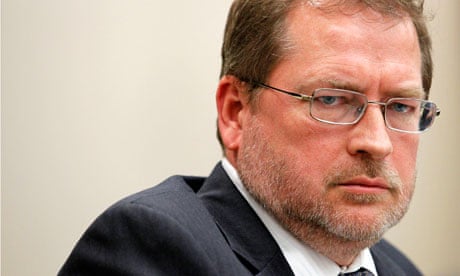One of the most powerful figures in Washington, Republican lobbyist Grover Norquist, headed off on holiday on Tuesday, leaving behind a trail of economic and political chaos while happily looking ahead to the next, even bigger battle: the 2012 elections.
Norquist, who has over the last two decades helped turn the Republicans into the party of no taxation, is blamed by the Democrats for single-handedly scuppering the Congressional supercommittee on the national deficit on Monday. Its collapse threw markets in the US and Europe into fresh turmoil, and reduced even further the standing of Congress among voters.
But Norquist was unconcerned. He was in a celebratory mood as, luggage and family packed into the car, he set off from Washington to Florida for the Thanksgiving break. With one victory behind him, he is already thinking about the 2012 White House and Congressional elections.
He expects the Republicans to take the White House but if they do not, there is a Plan B. He is confident they will take control of the Senate and, with both the House and Senate in Republican hands, he predicted Obama's second term would be a dead duck.
"Even if the Republicans do not take the White House, it would be like the second term of the Clinton administration but with a smarter Republican party, not cutting the president any slack," he said in a phone interview with the Guardian as he drove south.
The lobbyist, who runs Americans for Tax Reform, has a tight hold on the Republican party, having secured written pledges from almost all its members of Congress that they will not vote for a single tax rise. Any Republican who fails to sign that pledge faces a tough primary challenge. Any Republican contemplating supporting even a minimal increase will be reminded of that written promise.
All six Republicans on the supercommittee were signatories.
It was the tax issue that broke the supercommittee. The Democrats insisted on increases: the Republicans refused. It was the tax issue that led one of the Democrats, John Kerry, the 2004 presidential candidate, to describe Norquist as the 13th member of the committee.
Norquist, who boasts of having ensured that Republicans have not voted for tax increases for at least the last two decades, recalled running into Kerry in the Senate, and the Democrat asked him to chat about a possible deal. "Kerry spoke about tax rises and I thought 'Good luck with that. It is not happening.'"
Norquist, chatting by phone as he drove, interspersing thoughts about the political battles ahead with a running commentary on slow drivers hogging the fast lane – "I would yell at this car driving at 25mph but he has a marine sticker" – is happy the supercommittee collapsed. "I think it worked out as well as one could expect it to," he said. "I think we [the Republicans] are in reasonably good shape. This is all in anticipation of the election."
The failure to reach a deal means that $1.2 trillion is to be cut automatically from military and domestic spending beginning in 2013. The important thing for Norquist is that there will be no tax increases, as both Obama and the Democrats have demanded. It is not over and skirmishing over cuts in the national deficit and tax rises will dominate the coming year.
"Obama thinks he can trick the Republicans into raising taxes by threatening to cut defence. I do not think Republicans will fall into that trap," Norquist said.
By the time the cuts in military spending, which Republicans oppose, are due to start, the Republicans could have control of the House, the Senate and the White House, and be in a position to shift the balance from military cuts to cuts in benefits.
The next election will be fought on Republican terms, he said. "The size of government and spending and taxes – that is what we want it fought on. Obama wants to talk about 'I killed Osama bin Laden'. That is nice but stop stealing our money and spending it."
Norquist, aged 55, has been in politics since childhood. Both his parents were Republicans but more moderate than their son. At an age when other children were still watching cartoons, he said he bought the entire works of Hoover from the local library. He took the train from his home in Weston, Massachusetts, to Boston to work in the Nixon campaign office in 1968.
Returning from school one day, he had the idea that has dominated the Republican party for nearly 30 years, the single most important dividing line between Democrats and Republicans. "The thought I had when I was 12 was that the Republicans should brand themselves as the party that would not raise taxes."
The idea of the pledge came later. He set up Americans for Tax Reform in 1985 and the first signatures came a year later. Today, 238 out of the 242 Republicans in the House have signed the pledge, along with 41 out of the 47 Republican senators.
All the Republican presidential candidates have signed it, with the exception of former diplomat Jon Huntsman, an outsider who has never managed to get above single digits in polling. Norquist blames his poor showing on failing to sign the pledge, describing it as a strategic mistake to show a willingness to compromise on tax. Other Republicans seeking office show little inclination to make the same mistake of crossing Norquist.
